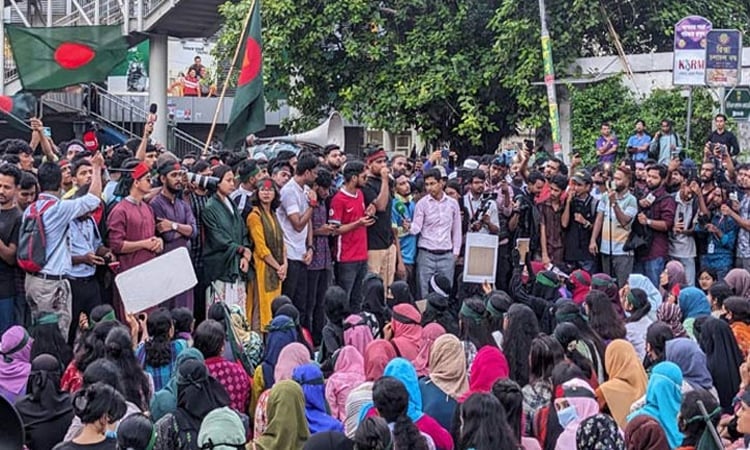News Flash
News Flash

DHAKA, July 29, 2025 (BSS) - The anti-discrimination student movement leaders on July 30 last year declared a nationwide "March for Justice" for July 31 protesting the mass killings, arbitrary arrests, enforced disappearances, and torture on students and civilians across the country.
Abdul Kader, one of the key coordinators of the quota reform movement, announced the programme around 11:15pm that day through the messaging app Telegram, saying the march would start at 12.30pm at all university campuses, court premises and streets across the country.
He also demanded an investigation into the incidents under the supervision of the United Nations (UN), justice for the killings and fulfillment of their nine-point demands including apology from the then Prime Minister Sheikh Hasina.
Kader further called upon the people from all strata, including teachers, lawyers, human rights defenders, professionals and workers, to join the programme expressing solidarity with the movement.
Earlier, on July 30, the students as well as the people observed the pre-declared 'red cloth protest' tying red cloth on their mouths and eyes as the government and the then ruling party supporters observed the national mourning day wearing black badges.
Many citizens including teachers, artists, journalists, writers and students turned their Facebook profile frames red in the memory of the people who were killed during the quota reform movement.
Besides, teachers of Rajshahi University and Jahangirnagar University brought out silent processions on their campuses tying red cloth on their mouths, denouncing the killings and arbitrary arrest by the law enforcers.
However, in the capital's Gulistan area, demonstrators brought out a procession featuring protest songs while police obstructed their rally.
During a rally at Purana Paltan intersection the same day, leaders of the Left Democratic Alliance demanded the government's resignation for carrying out repression on the protesters.
That evening, Education Minister Mohibul Hasan Chowdhury announced that educational institutions would be reopened in phases, depending on the improvement of the situation.
He also noted the potential for online classes as the internet services had been restored by that time.
Besides, civil society representatives from an event titled "Demand for Justice Against Killing, Illegal Detentions and Torture" held at Dhaka Reporters' Unity (DRU) that day warned that if six student movement coordinators and other detainees held by the Detective Branch were not released unconditionally within 24 hours, more intense protests would be given.
Dr Iftekharuzzaman, the executive director of Transparency International Bangladesh (TIB), issued the warning.
Meanwhile, the then Prime Minister Sheikh Hasina appealed to the United Nations and other international bodies to assist in a proper and impartial investigation into the violence took place during the quota reform movement. She expressed her commitment to holding perpetrators accountable.
In that afternoon, she visited the Shaheed Suhrawardy Medical College Hospital to see the people injured in the quota reform protests.
Besides, on the same day, the Cabinet Division instructed all administrations from metropolitan to union levels to form 'anti-terrorist and sabotage prevention committees' to maintain peace and order.
However, in an open letter to the then Prime Minister Hasina, Amnesty International Secretary General Agnes Callamard expressed deep concern over the killings and repression on the protesters during the movement, calling for justice and accountability.
UN Secretary-General Antonio Guterres also voiced concern, stating that the UN had credible evidence of use of excessive force and human rights violations by Bangladeshi law enforcement agencies during the movement. He expressed readiness to take any kind of steps in that situation.
The European Union's foreign policy chief, Josep Borrell, echoed this concern in a statement, condemning the order of "shoot-at-sight" and extrajudicial killings during the protests.
Besides, BNP Secretary General Mirza Fakhrul Islam Alamgir said that the government was using the banning of Jamaat-e-Islami to divert attention of the people from state-led massacres.
The six coordinators of the student movement were detained in the DB custody for five consecutive days However while the law enforcers were continuing mass arrest across the country with the curfew in effect. By July 30, the nationwide arrest figure reportedly surpassed 10,000 while 264 cases were filed in Dhaka alone over the violence during the quota reform movement.
Besides, that day, a group of guardians under the banner of Bangladesh Nari Mukti Kendra tried to stage a silent procession in front of Dhaka Medical College Hospital to denounce the killings, but police forcibly removed them.